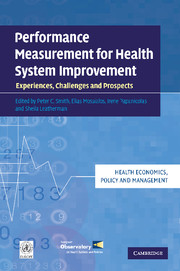Book contents
- Frontmatter
- Contents
- Foreword
- Acknowledgements
- List of contributors
- List of boxes, figures and tables
- Part I Principles of performance measurement
- Part II Dimensions of performance
- 2.1 Population health
- 2.2 Patient-reported outcome measures and performance measurement
- 2.3 Measuring clinical quality and appropriateness
- 2.4 Measuring financial protection in health
- 2.5 Health systems responsiveness: a measure of the acceptability of health-care processes and systems from the user's perspective
- 2.6 Measuring equity of access to health care
- 2.7 Health system productivity and efficiency
- Part III Analytical methodology for performance measurement
- Part IV Performance measurement in specific domains
- Part V Health policy and performance measurement
- Part VI Conclusions
- Index
2.7 - Health system productivity and efficiency
Published online by Cambridge University Press: 06 July 2010
- Frontmatter
- Contents
- Foreword
- Acknowledgements
- List of contributors
- List of boxes, figures and tables
- Part I Principles of performance measurement
- Part II Dimensions of performance
- 2.1 Population health
- 2.2 Patient-reported outcome measures and performance measurement
- 2.3 Measuring clinical quality and appropriateness
- 2.4 Measuring financial protection in health
- 2.5 Health systems responsiveness: a measure of the acceptability of health-care processes and systems from the user's perspective
- 2.6 Measuring equity of access to health care
- 2.7 Health system productivity and efficiency
- Part III Analytical methodology for performance measurement
- Part IV Performance measurement in specific domains
- Part V Health policy and performance measurement
- Part VI Conclusions
- Index
Summary
Introduction
In the light of apparently inexorable rises in health-care expenditure, the cost effectiveness of the health system has become a dominant concern for many policy-makers. Do the funders of the health system (taxpayers, insurees, employers or patients) get good value for money? Productivity measurement is a fundamental requirement for securing providers' accountability to their payers and ensuring that health system resources are spent wisely.
Productivity measurement spans a wide range – from the cost effectiveness of individual treatments or practitioners to the productivity of a whole system. Whatever level of analysis is used, a fundamental challenge is the need to attribute both the consumption of resources (costs) and the outcomes achieved (benefits) to the organizations or individuals under scrutiny. The diverse methods used include direct measurement of the costs and benefits of treatment; complex econometric models that yield measures of comparative efficiency; and attempts to introduce health system outcomes into national accounts.
Productivity analysis can be considered via two broad questions: (i) how are resources being used? and (ii) is there scope for better utilization of these resources? These questions can be considered for the whole health system and for organizations within it but most applied research at system level tends to concentrate on the first question. The second question is the primary concern of organizational studies.
This chapter begins with an outline of the fundamental concepts required for productivity analysis, distinguishing productivity from efficiency. This is followed by a discussion of the challenges associated with applying these concepts in the health sector in which it is particularly difficult to define and measure outputs and to determine the relationship between health-care resources (inputs) and outputs.
- Type
- Chapter
- Information
- Performance Measurement for Health System ImprovementExperiences, Challenges and Prospects, pp. 222 - 248Publisher: Cambridge University PressPrint publication year: 2010
- 3
- Cited by



